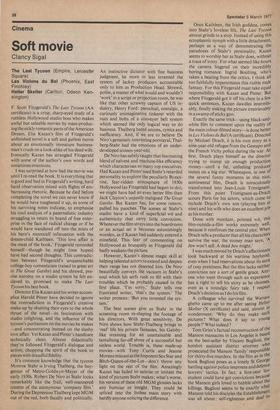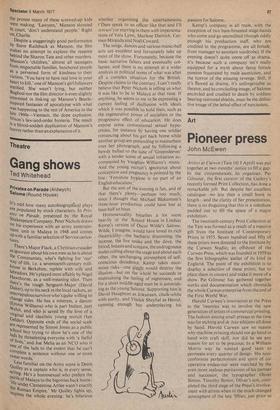Cinema
Soft movie
Clancy Sigal
The Last Tycoon (Empire, Leicester Square) Les Violons du Bal (Phoenix, East Finchley) Helter Skelter (Carlton, Odeon Kensington)
F. Scott Fitzgerald's The Last Tycoon (AA certificate) is a crisp, sharp-eyed study of a ruthless Hollywood studio boss who makes awful but saleable movies by mass-producing the sickly romantic parts of the American Dream. Elia Kazan's film of Fitzgerald's unfinished novel is a soft and gutless movie about an emotionally immature businessman's crush on a look-alike of his dead wife. Ironically Kazan has strangled Fitzgerald with some of the author's own words and sometimes intentions.
. I was surprised at how bad the movie was until I re-read the book. It is everything that is good and bad in Fitzgerald's writing, hard lucid observation mixed with flights of embarrassing rhetoric. Because he died before completing the novel we can never know if he would have toughened it up, as some of his surviving notes indicate, to emphasise his cool analysis of a paternalistic industry struggling to retain its brand of free enterprise in the face of radical change or if he would have wandered off into the mists of his hero's mooncalf infatuation with the dream-child Kathleen. 'This love affair is the meat of the book,' Fitzgerald reminded himself—though he might (one hopes) have had second thoughts. This contradiction between Fitzgerald's unquenchable college-boy romanticism (raised to great art in The Great Gatsby) and his shrewd, precise autopsy on a studio system he felt enslaved to, promised to make The Last Tycoon his best book.
Director Elia Kazan and his writer accomplice Harold Pinter have decided to ignore the contradiction in Fitzgerald's creative make-up by shutting their eyes to the whole thrust of the novel—its fascination with studio infighting, and the influence of the tycoon's puritanism on the movies he makes —and concentrating instead on the slushy love affair. Yet Kazan and Pinter's hands are technically clean. Almost didactically they've followed Fitzgerald's dialogue and action, chopping the spirit of the book to pieces with dreadful fidelity.
It's common knowledge that the tycoon Monroe Stahr is Irving Thalberg, the boygenius of Metro-Goldwyn-Mayer of the early 1930s. Robert De Niro as Stahr looks remarkably like the frail, well-mannered creator of the anonymous 'company film.' During the Depression Thalberg kept MG M out of the red, both fiscally and politically. An instinctive dictator with fine business judgment, he more or less invented the system of lackey producers accountable only to him as Production Head. Shrewd, polite, a master of what would and wouldn't 'work' in a script or projection room, he was like that other scrawny captain of US industry, Henry Ford : parochial, nostalgic, a curiously unimaginative tinkerer with the nuts and bolts of a conveyor belt system which seemed the only logical way to do business. Thalberg hated unions, cynics and inefficiency. And, if we are to believe De Niro's genuinely interesting portrayal, Thalberg-Stahr had the emotions of an underdeveloped sixteen-year-old.
De Niro has subtly caught that fascinating blend of naïveté and machine-like efficiency which characterises so many top executives. Had Kazan and Pinter used Stahr's retarded personality to explore the peculiarly Byzantine, fear-ridden atmosphere of 1930s Hollywood (as Fitzgerald had begun to do), we might have had an even better film than Jack Clayton's unjustly maligned The Great Gatsby. But Kazan has, for some reason, pulled his punches. The scenes at Stahr's studio have a kind of superficial wit and authenticity that carry little conviction. Whenever the film strays into the boardroom or an actual set it becomes astonishingly wooden, as if Kazan had suddenly entered a minefield. This fear of commenting on Hollywood as brusquely as Fitzgerald did badly weakens the picture.
However, Kazan's almost magic skill at helping talented actors to extend and deepen their range has not deserted him. De Niro beautifully conveys the vacuum in Stahr's soul which hrs serfs rush to fill with their troubles which he probably caused in the first place. 'I'm sorry,' Stahr tells one frustrated writer, 'that's the system.' The writer protests : 'But you invented the system.'
The best scenes give us Stahr in the screening room re-shaping the footage of his directors. With great sensitivity, De Niro shows how Stahr-Thalberg brings to 'reel' life his private fantasies, his Gatsbylike straining for an unattainable and tantalising far-off shore of a successful but sinless world. Trouble is, these made-up movies—with Tony Curtis and Jeanne Moreau miscast as the Impotent Sex Star and Bitch-Queen-of-the-Lot—don't throw any light on the rest of the film. Amazingly Kazan has failed to satirise or imitate the kind of pictures Stahr makes; what's worse, his version of these old MGM glossies lacks any humour or insight. They could be spliced into the listless main story with hardly anyone noticing the difference.
Once Kathleen, the Irish goddess, comes into Stahr's loveless life, The Last Tycoon almost grinds to a stop. Instead of using this ectoplasmic nymph with a little detachment, perhaps as a way of demonstrating the paradoxes of Stahr's personality, Kazan seems to worship her as Stahr does, without a trace of irony. For what seemed like hours the camera lingered on their incredibly boring romance. Ingrid Boulting, who's taken a beating from the critics, I think all too faithfully impersonates this risible male fantasy. For this Fitzgerald must take equal responsibility with Kazan and Pinter. But where Fitzgerald got it off his chest in a few quick sentences, Kazan dawdles interminably, finally sinking the picture irretrievablY in a swamp of sticky goo.
Exactly the same trick—using black-andwhite film to comment upon the reality of the main colour-filmed story—is done better in Les Violons du Bat (A certificate). Directed by Michael Drach, it is his own story as a nine-year-old refugee from the Gestapo and the French Vichy police during the war. At first, Drach plays himself as the director trying to stump up enough production money—until a fat, unfeeling producer insists on a big star. Whereupon, in one of the several funny moments in this nice, sentimental film, Drach is miraculously transformed into Jean-Louis Trintignant. From this point Trintignant-as-Drach scours Paris for his actors, which come to include Drach's own son (playing him at nine) and his wife who does an excellent job as his mother.
Done with mordant, pointed wit, this film-outside-a-film works extremely well, because it reinforces the central plot. When Drach tells a producer that all his characters survive the war, the money man says, 'A Jew won't sell. A dead Jew might.'
I was much moved by Drach's affectionate look backward at his wartime boyhood, even when I had reservations about its aura of cosy prettiness. But the film lacks neither conviction nor a sort of gentle grace. Anyone who went through such an experience has a right to tell his story as he chooses, even as a nostalgic fairy tale. I respect Drach's decision as I do his film.
A colleague who survived the Warsaw ghetto came up to me after seeing Heber Skelter (X certificate) and said, almost In wonderment: 'Why do they make such pictures? What does it say to young people ?' What indeed ? Tom Gries's factual reconstruction of the Manson massacres in Los Angeles is based on the best-seller by Vincent Bugliosi, the hotshot assistant district attorney wh° prosecuted the Manson 'family' responsible for thirty-five murders. In the film as in the book Bugliosi poses as a lonely St George battling against police ineptness and defence lawyers' tactics. In fact, a first-year law student could have got convictions because the Manson girls loved to babble about the killings. Bugliosi seems to be exactly What Manson told his disciples the Establishment was all about : self-righteous and deaf t°
the protest many of these screwed-up kids were making. 'Lawyers,' Manson shouted In court, 'don't understand people.' Right on, Charlie. .
Despite a staggeringly good performance by Steve Railsback as Manson, the film makes no attempt to explore the reasons behind the Sharon Tate and other murders. Manson's 'children,' almost all teenagers from respectable families, butchered people as a. perverted form of kindness to their victims. 'You have to have real love in your heart to kill,' one of Manson's girl followers testified. She wasn't lying, but neither .Bugliosi nor the film director is even slightly interested in linking up Manson's BeatleInspired fantasies of apocalypse with what was happening to the rest of America in the late 1960s—Vietnam, the dope explosion, .Nixon's law-and-order hysteria. The result Is a blood-sodden duplication of Manson's horror rather than an explanation of it.



































 Previous page
Previous page